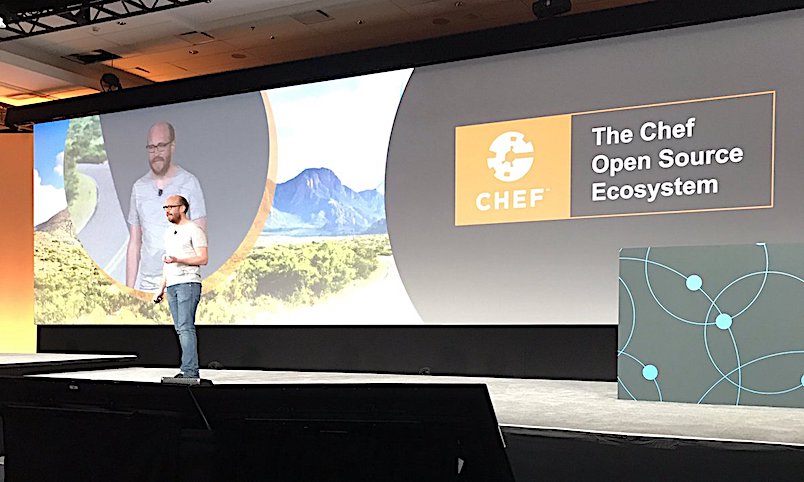Cloud-native computing environments tend to become frightfully difficult to build, provision, monitor and control. This is especially true as more containerized apps are pushed into more distributed clusters that are running on more complex multiclouds.
These environments are also quite fragile, as new containerized apps carry compliance risks and may, if they run afoul of complex dependencies, disrupt interoperability to legacy apps and infrastructure. Lessening these burdens and mitigating these risks is central to the jobs of DevOps professionals in this new era.
In that regard, Chef Software—one of the leading providers of cloud-native configuration management solutions—made several significant announcements this week at its annual ChefConf event (pictured). Touting what it offers as “continuous automation” for DevOps, Chef’s key announcements were as follows:
- Automating deployment of cloud-native application logic: The company announced Chef Automate’s new Builder service functionality for automating the packaging, managing and running of container-based cloud-native microservices. Builder relies on Habitat, which provides templates and thereby accelerates the process. The new Habitat Scaffolding services provide default cloud-native packaging options for popular languages and frameworks such as Ruby on Rails and Node.js. The enterprise-ready Habitat Plans provide 20 core build plans for such scenarios as big data (Cassandra, Spark, Storm, Kafka, Zookeeper, CrateDB), monitoring (Prometheus, Grafana), middleware (WebSphere, MuleSoft, Varnish, RabbitMQ, Consul), databases (PostgreSQL, MySQL, Redis, Shield backup) and developer and content tools (Jenkins, Drupal, WordPress). And any package that Chef accepts and curates as “Core” will be automatically rebuilt as their dependencies are updated. Any of these packaged apps can be exported to any target runtime–such as Docker–to be deployed through containerized orchestration environments such as Kubernetes, OpenShift and Mesosphere DC/OS.
- Boosting assurance of cloud-native application compliance: The company also announced that its core solution, Chef Automate, now integrates directly with InSpec, its open-source compliance automation framework, to automate the validation of end-to-end microservice application compliance. In addition, it released separate incubation projects that test, interact and audit AWS, Azure and VMWare cloud platforms directly from inside InSpec.
- Instilling DevOps automating skills in its customer base: Recognizing that effective utilization of its automation tools depends on skilled users, Chef launched Learn Chef Rally, which provides a comprehensive tutorials, articles and technical documents that cover the gamut of DevOps requirements. This resource provides a gamified experience to encourage users to measure, share and seek formal certification of their progress in acquiring skills in cloud-native app automation.
There’s a vibrant and growing market for cloud-native DevOps automation capabilities such as these, as was abundantly evident in this year’s ChefConf. The event continues to grow year after year as the company, its product portfolio, its customer base and its partner ecosystem expand. Here are some key metrics of growth discussed at ChefConf 2017:
- The event now includes around 1,500 DevOps practitioners worldwide.
- Chef’s online community now includes 70,000 members.
- Its open-source solutions have been downloaded 40 million times
- It has doubled its new enterprise customers over the past two years.
- Sales grew by almost 50 percent last year.
- The company has now serves more than 150 customers in Europe, the Middle East and Africa and more than 50 in Asia-Pacific.
- It now has more than 1,000 customers around the world, including more than half of the companies on the Fortune 50.
- Its open-source community platform, called Supermarket, includes more than 5,000 new members, and includes more than 5,000 releases of the fundamental unit of cloud-native app configuration and policy distribution known as “cookbooks.”
- Chef attracted 198 new partners in 2016, raising its ecosystem to more than 400 partners worldwide, including leading cloud companies such as Amazon Web Services Inc., Microsoft Corp., Google Inc. and IBM Corp., many of whom made significant announcements at this year’s ChefConf.
For further details on announcements and buzz at ChefConf, check out these other resources:
Photo: Chef/Twitter
A message from John Furrier, co-founder of SiliconANGLE:
Support our mission to keep content open and free by engaging with theCUBE community. Join theCUBE’s Alumni Trust Network, where technology leaders connect, share intelligence and create opportunities.
- 15M+ viewers of theCUBE videos, powering conversations across AI, cloud, cybersecurity and more
- 11.4k+ theCUBE alumni — Connect with more than 11,400 tech and business leaders shaping the future through a unique trusted-based network.
About SiliconANGLE Media
SiliconANGLE Media is a recognized leader in digital media innovation, uniting breakthrough technology, strategic insights and real-time audience engagement. As the parent company of
SiliconANGLE,
theCUBE Network,
theCUBE Research,
CUBE365,
theCUBE AI and theCUBE SuperStudios — with flagship locations in Silicon Valley and the New York Stock Exchange — SiliconANGLE Media operates at the intersection of media, technology and AI.
Founded by tech visionaries John Furrier and Dave Vellante, SiliconANGLE Media has built a dynamic ecosystem of industry-leading digital media brands that reach 15+ million elite tech professionals. Our new proprietary theCUBE AI Video Cloud is breaking ground in audience interaction, leveraging theCUBEai.com neural network to help technology companies make data-driven decisions and stay at the forefront of industry conversations.
 APPS
APPS
 APPS
APPS
 APPS
APPS